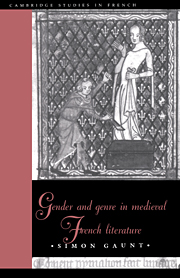Book contents
- Frontmatter
- Contents
- Acknowledgements
- List of abbreviations
- Introduction
- 1 Monologic masculinity: the chanson de geste
- 2 The knight meets his match: romance
- 3 Troubadours, ladies and language: the canso
- 4 Saints, sex and community: hagiography
- 5 Genitals, gender and mobility: the fabliaux
- Conclusion
- Notes
- Bibliography
- Index
- CAMBRIDGE STUDIES IN FRENCH
4 - Saints, sex and community: hagiography
Published online by Cambridge University Press: 24 August 2009
- Frontmatter
- Contents
- Acknowledgements
- List of abbreviations
- Introduction
- 1 Monologic masculinity: the chanson de geste
- 2 The knight meets his match: romance
- 3 Troubadours, ladies and language: the canso
- 4 Saints, sex and community: hagiography
- 5 Genitals, gender and mobility: the fabliaux
- Conclusion
- Notes
- Bibliography
- Index
- CAMBRIDGE STUDIES IN FRENCH
Summary
Hagiography is good for medievalists. I do not thereby mean that the texts are necessarily good for their souls (though they may be), but rather that saints' lives offer a useful corrective to the reading experience of most modern readers of vernacular medieval literature, which is often grounded almost entirely in profane texts. The understandable preference of modern readers for genres which their own aesthetic and ideological predilections render accessible distorts their view of medieval culture. As every art historian, historian or medieval Latinist knows, the Middle Ages were deeply Christian, yet all too often students and critics of vernacular literature focus on the chivalric and courtly margins, thereby failing to appreciate the centrality of the dominant Catholic culture. The profane texts students of Old French and Occitan mostly read represent a tiny proportion of the texts produced in medieval France and Occitania. Even in the vernacular the quantity of religious texts which has survived is far greater than their availability in modern editions suggests and vernacular hagiography was at least as popular as other literary genres, if not more so. Modern views of medieval vernacular writing are skewed by the marginalization of hagiography. Saints' lives are frequently presented as tedious and repetitive, as unsophisticated as they are heavy-handed in their ideology. Hagiography may indeed be an acquired taste for the modern reader, but the genre offers some fine, uncannily moving texts.
- Type
- Chapter
- Information
- Gender and Genre in Medieval French Literature , pp. 180 - 233Publisher: Cambridge University PressPrint publication year: 1995



